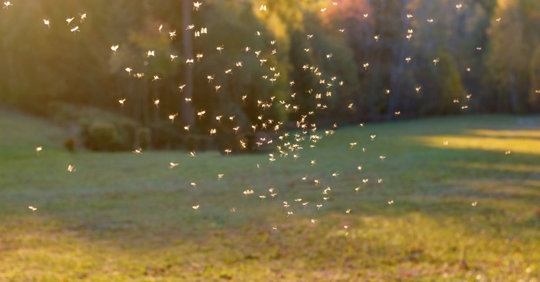Insects vs. Rodents: Key Differences
When it comes to pests, both insects and rodents present unique challenges, but understanding their differences is crucial for effective control. Insects, such as flies, ants, and mosquitoes, are generally smaller, reproduce rapidly, and can invade your home in large numbers. They often require specific environmental conditions and can spread certain diseases, which makes them a concern for homeowners. Rodents, on the other hand, such as rats and mice, are larger and can cause significant structural damage to homes by gnawing on electrical wires, insulation, and even wooden structures. Furthermore, rodents are known carriers of several serious diseases, including hantavirus and leptospirosis.
Recognizing these distinctions is essential when it comes to formulating an effective pest management strategy. Insect infestations often require treatments that target specific life cycles and environments, such as using insecticides or natural deterrents. Rodents, meanwhile, may require more robust solutions like traps and physical barriers to prevent entry. Understanding the biology and behavior of these pests can significantly improve the efficacy of your control measures, ensuring a pest-free environment for your home.
Geographical Variations in Pest Activity
Pest prevalence and activity can vary greatly depending on geographic locations, which is often influenced by the climate and weather patterns of the area. For instance, in warmer regions or during the summer months, you're likely to encounter an uptick in pests, such as mosquitoes and ants, due to conducive conditions for their breeding and development. In contrast, some cooler climates may see a different set of pests that prefer milder or more moist environments.
Specific pest species are often more prevalent in certain areas; for instance, in humid climates like in the southern United States, fire ants are a common nuisance, while in drier, warm areas, scorpions may pose a threat. Awareness of these regional differences can help in selecting appropriate pest control methods. By staying informed about the types of pests that are most active in your area during the summer, you can better prepare and implement preventive measures tailored to your local environment, thereby reducing the likelihood of a serious infestation.
Mosquitoes: More than Just an Itch
Mosquitoes are notorious summertime pests that not only cause itchy bites but can also pose serious health risks. Mosquitoes are known carriers of various diseases, including the West Nile and Zika viruses, both of which have had outbreaks in recent years. These diseases can result in severe illness, and in some cases, can be life-threatening. Therefore, it's essential for homeowners to take preventive measures to reduce mosquito populations around their properties.
There are several practical steps you can take to minimize mosquito presence. One effective method is to eliminate any standing water around your home, as mosquitoes breed in stagnant water. Additionally, using natural repellents, such as citronella candles or essential oils like eucalyptus and lavender, can deter mosquitoes from invading your space. Ensuring that your screens are intact and sealing any gaps can also help keep these pesky insects out of your living areas. By employing these strategies, you can reduce the risk of mosquito-borne diseases and reclaim your outdoor spaces for enjoyment throughout the summer.
Ant Infestations: Beyond the Picnic
Ants are more than just the uninvited guests at your picnic; they are persistent pests that can invade homes in search of food and shelter. During the summer months, several types of ants become more active, including carpenter ants, odorous house ants, and pavement ants. Carpenter ants can be particularly problematic, as they excavate wood inside structures, potentially causing significant damage over time. Odorous house ants, while not destructive, can contaminate food sources and become a nuisance due to their large colonies.
To prevent and manage ant infestations, focus on maintaining good sanitation and sealing entry points around your home. Keep food stored in airtight containers and clean up spills promptly. Regularly inspect your home for signs of ant activity, such as trails or nests, and seal off any potential entry points using caulk or weather stripping. In some cases, natural deterrents like vinegar or peppermint oil can help repel ants without resorting to chemical treatments. If you find that these measures are insufficient, professional pest control services can provide targeted solutions to effectively address any ant problems.
Stinging Insects: Wasps and Hornets
Wasps and hornets can turn a peaceful summer day outdoors into a stressful ordeal if they happen to create nests nearby. These stinging insects are particularly aggressive when they feel threatened and can deliver painful stings. Identifying signs of nests early on is crucial, as wasps and hornets tend to build them in sheltered spots around homes and gardens, such as under eaves, in sheds, or even underground. Some common signs include increased activity around specific areas and visible paper-like structures that serve as their nests.
Safe removal of wasp and hornet nests should be approached with caution, as disturbing these pests can lead to aggressive behavior. For small, easily accessible nests, using a natural wasp repellent or an over-the-counter insecticide from a safe distance might do the trick. However, if the nest is large or in a difficult-to-reach spot, it is wise to seek professional assistance. Pest control experts can ensure safe and effective removal of wasp and hornet nests, protecting your family and reducing the risk of stings while allowing you to enjoy your outdoor spaces comfortably.
Rats and Mice: Unwanted Summer Guests
Rats and mice notoriously thrive during the summertime, seeking out food and shelter in residential areas. Warmer temperatures and abundant food supplies contribute to their increased activities. Unfortunately, these rodents can cause significant damage to property, chewing through electrical wiring and insulation, which not only damages your home but also poses a potential fire hazard. In addition, they are vectors for numerous diseases that can impact human health, such as salmonellosis and hantavirus.
To deter these unwanted guests from taking up residence, homeowners can implement several tactics. Effective solutions include sealing gaps and entry points with durable materials such as metal mesh and using rodent-proof storage containers. Effective baiting solutions, such as snap or electronic traps, placed strategically around the home and garden can reduce rodent populations. If these methods prove ineffective, enlisting the help of pest control professionals can provide thorough inspections and tailored solutions, ensuring the complete eradication of rodent infestations.
Squirrels: Cute but Destructive
Squirrels, while often seen as harmless and even charming, can become troublesome when they target gardens and homes during the summer. These agile creatures are notorious for raiding bird feeders and digging up flowerbeds, but the problems they pose don't end there. Squirrels can also cause extensive damage to homes by gnawing through siding, roofs, and even attic insulation in search of nesting sites. This can lead to significant repair costs and structural integrity concerns over time.
To mitigate squirrel-related destruction, it’s beneficial to employ non-lethal repellent strategies. Start by securing potential entry points around your home and removing any tempting food sources that might attract them to your property. Installing baffles on bird feeders can deter their efforts and protect your bird seed supply. Natural deterrents, such as cayenne pepper or garlic sprays, can prevent squirrels from feasting on plants and vegetables. For more persistent cases, pest control services can deploy humane traps and exclusion techniques to manage squirrel populations effectively.
Landscaping Tips to Deter Pests
Landscaping is not only about aesthetics but also plays a critical role in deterring pests from making themselves at home. Proper landscaping techniques can reduce environments conducive to pest colonization. For instance, maintaining trimmed and well-kept lawns can prevent pests like ticks and mosquitoes from finding a safe haven in tall grass and dense foliage. Similarly, keeping flowerbeds and bushes well-trimmed will reduce places where pests can hide and breed.
Further, incorporating pest-repellent plants into your garden can naturally deter common summertime insects. Plants such as lavender, marigolds, and citronella grass act as natural repellents due to their scent, which is unpleasant to many pests. Strategic planting of these botanicals around entrances to your home and outdoor spaces can create a natural barrier against pest invasions, enhancing both your garden's beauty and functionality. For homeowners working with local landscaping experts can further optimize these efforts to suit regional plant varieties and pest trends.
Sealing Entry Points: A Proactive Approach
One of the most effective ways to keep pests at bay is to seal their entry points around your home. Pests like insects and rodents are adept at squeezing through small gaps and cracks in search of food and shelter. Conducting a thorough inspection to identify potential entry points is crucial. Pay particular attention to areas around windows, doors, vents, and utility penetrations.
Once identified, sealing these access points can greatly reduce the chances of an infestation taking hold. Use durable materials like steel wool, caulking, or weather stripping to block entryways. Regular inspections throughout the year can ensure that these barriers stay intact, adapting to any changes your home may undergo due to weather or structural shifts. By employing these proactive measures, you can maintain a secure, pest-free environment, reducing reliance on chemical treatments and the need for emergency pest control interventions.
## Natural and Chemical Pest Control Solutions
Natural Remedies: Eco-Friendly Pest Management
For those who are environmentally conscious and prefer green solutions, natural pest control remedies can be an effective approach to managing pest problems. Ingredients like diatomaceous earth, boric acid, and essential oils such as peppermint and tea tree offer nontoxic alternatives to chemical pesticides. These solutions can be highly effective in dealing with insects and small rodents when used correctly, disrupting their biological functions and deterring their presence.
However, while natural remedies can be effective, it’s important to understand their limitations. These remedies often require more frequent application and may not be as instantly effective as their chemical counterparts, especially in severe infestations. Additionally, effectiveness can depend on proper application and environmental factors. Nevertheless, they provide a safer option for households with pets and young children, and for those who wish to minimize their environmental footprint. Consulting with local pest experts can help you integrate these natural methods into your pest management strategy successfully.
Chemical Treatments: When Are They Necessary?
Chemical pest control methods are sometimes unavoidable, especially in severe infestations where other methods have proven ineffective. Chemical pesticides are available in various forms, including sprays, granules, and baits, each designed to target specific pests efficiently. When applied correctly, these chemicals can quickly reduce pest populations and provide a lasting barrier against future invasions.
However, it’s essential to use chemical treatments responsibly, as improper use can lead to potential health risks and environmental damage. Many local regulations require users to follow strict guidelines to ensure safe application. Always read labels carefully and, when in doubt, consult a professional. For residents those seeking the guidance of pest control services can ensure that treatments are applied effectively and responsibly, aligning with local environmental and health standards.
Consulting with Pest Control Professionals
Sometimes, despite your best efforts, pest problems can persist and require the expertise of professionals. Knowing when to call in the experts can save time, stress, and potentially more significant damage to your property. Pest control professionals offer specialized knowledge and equipment tailored to tackle local pest challenges efficiently. They provide comprehensive inspections, targeted solutions for various pests, and ongoing management plans to keep infestations at bay.
By enlisting professional help, you can benefit from customized strategies that address the root of the problem, ensuring a safer and more thorough resolution than do-it-yourself methods might offer. Collaborative efforts with pest control experts can enhance your understanding of pest behaviors, prevention tactics, and best practices for maintaining a pest-free home environment throughout the seasons.
Frame's Pest Control, Inc. Is Here for You This Summer
Whether you're dealing with a current infestation or taking preventive measures, Frame's Pest Control, Inc. offers the expert services you need this summer. Remember, by staying informed and proactive, you can create a healthy and comfortable living environment while minimizing the impact of pests on your property and well-being year round.
Frame's Pest Control, Inc. is available by phone at (877) 803-5966 or you can always contact us online.


